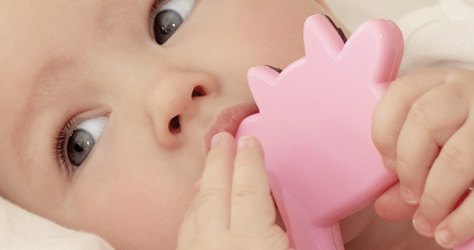At a glance
- Some babies are born with their first teeth
- Usually teething will start teething at around 3 months old
- Symptoms include sore gums and heavy drooling

When will my baby go through teething?
Your baby will actually start developing their first teeth whilst they are still in the womb. It’s possible that your baby will be born with their first baby teeth but it’s most common for them to start teething between the ages of 3 months and 12 months old.
Usually it’ll be the bottom front teeth that come through first, followed by the top front teeth and then the incisors and finally the molars. Usually your baby will have all their milk teeth by the age of 2 or 3.
It’s important that as soon as teeth start to show through that they’re being cared for and cleaned thoroughly, this will not only help to avoid any issues with your little one’s teeth, it’ll also help to build a routine for cleaning their teeth in the future.
What are the symptoms of teething?
Teething will affect each baby differently, with some not being too bothered by the process whilst for others it can be quite a painful process. When your baby starts teething you may notice the following symptoms:
- Gums becoming sore and red as the teeth start to push through
- One cheek may be flushed on the side the teeth are coming through
- Upset or irritable
- Dribbling or heavy drooling
- Restless and having trouble sleeping
- Not feeding well
What can I do to alleviate my baby’s teething pain?
Teething can be a long and painful process for your baby but fortunately there are a number of different teething products and solutions to help make the process a little more comfortable:
Teething rings – These rings can be liquid filled or silicon based, and can be put into a fridge before giving to your baby to provide them with something cool to suck and chew on. This will provide relief for their sore gums.
Cool drinks – Giving your baby a cool, sugar-free drink can help to sooth their gums and provide relief. Cool water is usually a good option.
Teething gel – If your baby is in more severe pain, you might want to try a teething gel which can be rubbed onto their gums directly, which may provide temporary numbing and pain relief although there isn't sufficient research to confirm how effective teething gels are.
Comfort or distract them – Quite often a cuddle or playing with your baby can be enough to distract them from the pain they’re experiencing through teething. They might not feel in the mood to play but it can be a good way to bond with your baby whilst taking their mind off of the pain.
How long will teething last?
There’s no set time frame for when your baby’s first tooth may arrive and for how long they may be experiencing teething for, although generally, once the first few have come through the other’s shouldn’t be as painful for your baby.
If your baby is born with their first tooth it doesn’t necessarily mean they’ll be done teething any quicker than a baby who starts teething a few months after birth, and it’s even possible that they might not start teething until around 12 months old. Generally though, your little one will have their full set of milk teeth through by 2 and a half years old.